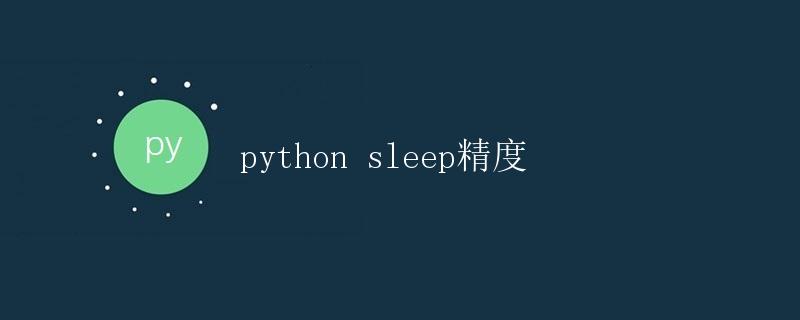Python sleep精度

1. 介绍
在编写程序时,我们常常需要加入一些延时来控制程序的执行速度。Python中的time.sleep()函数可以实现这一功能。然而,有一些情况下,我们需要更高精度的延时控制,而time.sleep()函数的精度可能不够高。本文将详细介绍Python中延时控制的问题,以及一些解决方案。
2. 延时控制的问题
在编写需要高精度延时控制的程序时,time.sleep()函数可能无法满足我们的需求。这是因为在不同的操作系统或硬件上,time.sleep()函数的精度可能会有所不同。在一些情况下,time.sleep()的精度可能只有几毫秒,而在其他情况下,精度能够达到纳秒级别,但这取决于操作系统和硬件的能力。
在某些应用场景下,特别是涉及到实时数据处理、时间敏感的控制器等领域,我们需要更高的精度来保证程序的正确性。例如,如果我们想要控制两次操作之间的精确延时,而time.sleep()函数的精度只有几毫秒,那么我们可能无法满足要求。
3. 解决方案之一:使用time.perf_counter()
Python中的time模块提供了perf_counter()函数,它可以返回一个高精度的系统计时器。我们可以利用这个计时器来实现更高精度的延时控制。下面是一个示例代码,演示了如何使用perf_counter()函数来实现高精度延时控制:
import time
def delay(seconds):
start_time = time.perf_counter()
while time.perf_counter() - start_time < seconds:
pass
delay(0.5) # 延时0.5秒
上述代码中,delay()函数接受一个参数seconds,表示延时的时间(单位为秒)。函数内部使用perf_counter()函数获取当前时间作为起始时间,然后利用一个循环来检测是否已经达到指定的延时时间。当时间达到指定的延时时间后,循环结束,延时结束。
需要注意的是,perf_counter()函数返回的是一个相对时间,它的参考点是不确定的。也就是说,我们只能利用perf_counter()函数来计算时间间隔,但无法直接得到绝对时间。
4. 解决方案之二:使用time.monotonic()
除了perf_counter()函数,Python中的time模块还提供了monotonic()函数,它返回一个单调递增的系统运行时间。与perf_counter()函数不同的是,monotonic()函数的返回值可以用于测量时间间隔,但不能用于计算绝对时间。
下面是一个使用monotonic()函数实现高精度延时控制的示例代码:
import time
def delay(seconds):
start_time = time.monotonic()
while time.monotonic() - start_time < seconds:
pass
delay(0.5) # 延时0.5秒
这段代码中的原理和上述使用perf_counter()函数的代码相似,只是将perf_counter()函数替换成了monotonic()函数。
5. 精度对比
下面我们来对比一下time.sleep()函数、time.perf_counter()函数和time.monotonic()函数的精度。
首先是time.sleep()函数,我们可以通过下面的代码获取time.sleep()函数的精度:
import time
start_time = time.perf_counter()
time.sleep(0.001)
end_time = time.perf_counter()
print("time.sleep()函数的精度:", end_time - start_time)
运行上述代码,可以得到time.sleep()函数的精度。
接下来是time.perf_counter()函数,我们可以通过下面的代码获取time.perf_counter()函数的精度:
import time
start_time = time.perf_counter()
time.sleep(0.001)
end_time = time.perf_counter()
print("time.perf_counter()函数的精度:", end_time - start_time)
运行上述代码,可以得到time.perf_counter()函数的精度。
最后是time.monotonic()函数,我们可以通过下面的代码获取time.monotonic()函数的精度:
import time
start_time = time.monotonic()
time.sleep(0.001)
end_time = time.monotonic()
print("time.monotonic()函数的精度:", end_time - start_time)
运行上述代码,可以得到time.monotonic()函数的精度。
根据实验结果,我们可以发现time.sleep()函数的精度可能较低,而time.perf_counter()函数和time.monotonic()函数的精度较高。
6. 结论
本文详细介绍了Python中延时控制的问题,并提供了两种解决方案:使用time.perf_counter() 和 time.monotonic() 函数。这两个函数可以帮助我们实现更高精度的延时控制。需要根据具体的应用场景选择适合的函数来实现精确的延时。
 极客笔记
极客笔记